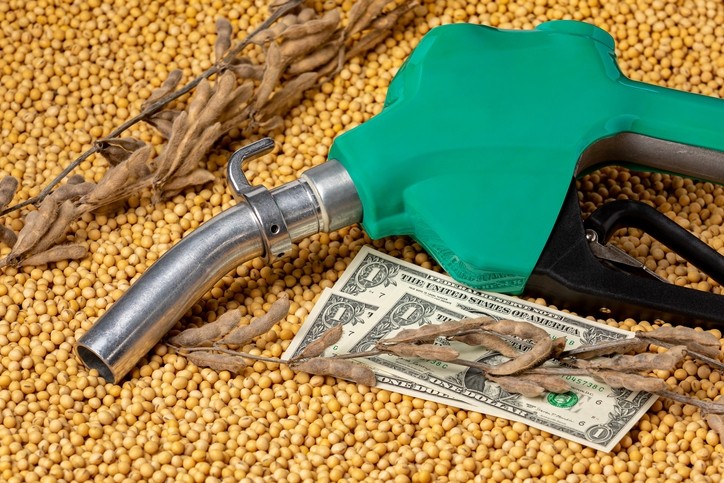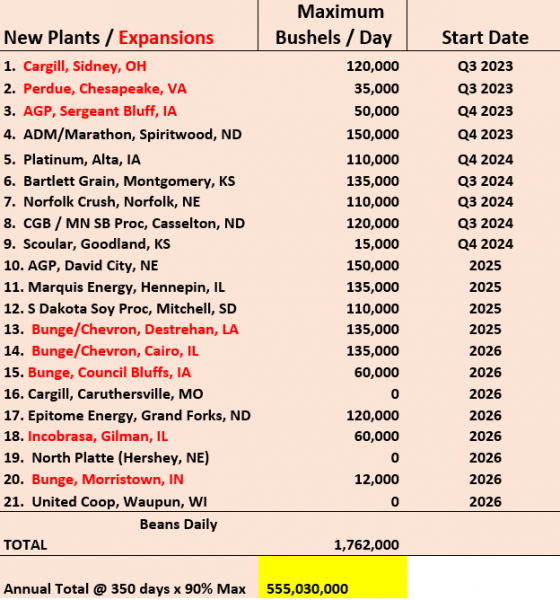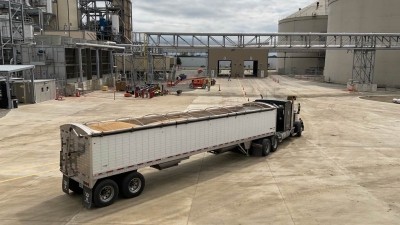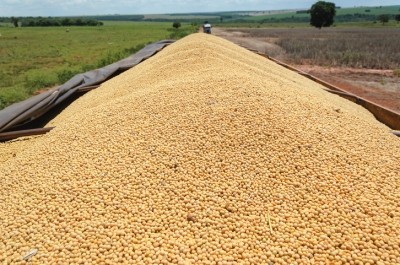Renewable diesel demand: Are the considerable investments in US soy crush production capacity at risk?

Juan Luciano, chairman and CEO of ADM, speaking during a Q1 earnings call on April 25, said the company believes demand for biofuel and renewable diesel is robust, driving continued strong growth crush margins and supporting the company’s investment in that plant.
The facility, which is a joint venture between ADM and Marathon Petroleum, is scheduled to come online in time for the 2023 harvest; it will have crush capacity of 150,000 bushels per day and will produce soybean oil as a feedstock for renewable diesel production. Marathon is responsible for delivering the oil into the fuel sector, while ADM looks after the soybean meal (SBM) side of the partnership.
Luciano also told the analysts he expects SBM inclusion levels in global feed rations to rise, and for US meal to be highly competitive on world markets.
“Biofuels will be an important part of the future. US will be a key player in biofuel and ADM will be absolutely in a strong position to deliver on that,” the CEO stressed on the call.
EPA proposals may undermine investments
The ADM Marathon plant is just one of many new or expanded soybean processing facilities pegged to come online over the next few years.
The US currently has around 60 crushing plants with a total capacity of about two million bushels per year. To date, there have been announcements made for new builds along with existing processing plant expansions; they would add about 750 million bushels per year in processing capacity.
Potentially, there are 13 new sites coming on stream along with eight plants set to expand operations.
Many of those projects are being driven by the growth in renewable diesel, to meet demand for soybean oil as a renewable feedstock.
But in December 2022, the US Environmental Protection Agency (EPA) released its proposed multiyear Renewable Fuel Standard (RFS) volumes for 2023 to 2025; that called for biomass-based diesel volumes below actual production for the next three years, potentially putting some of US crushing expansion projects in question.
Biomass-based diesel is a category that includes biodiesel, renewable diesel, heating oil or jet fuel, which meets the definition of either biodiesel or renewable diesel that reduces GHG emissions by 50%, per gallon of comparable fossil fuel.
When asked about the EPA proposal on the earnings call, Vikram Luthar, senior VP and CFO of ADM, said: “The RVO [Renewable Volume Obligations] proposal that came out was largely constructive for the biofuels industry and we appreciated the multiyear proposal as well as the strong support for conventional ethanol. We, however, did note in our testimony and written comments to the EPA, the opportunity for improvement in the advanced category of biomass-based diesel.
“We expect that the EPA is going to consider the feedback they've got from the industry, and we are constructive about what that outlook is going to look like. But nevertheless, we are confident about the growth of the renewable diesel capacity and the ongoing benefit and impact for crush margins going forward.”
Slowdown in crush expansion
Gordon Denny, US soy industry consultant, is not so ebullient. He believes US soy crush capacity will continue to increase; it just won’t be as large as originally anticipated.
“Expansion is ongoing. We are still seeing the most significant growth we've ever seen in the industry. But instead of a 30 to 32% increase over the next three years, I think it will be more in the region of a 25% gain in crush capacity. Some plant builds are likely to be put on hold, others might see their construction delayed.”
Cargill’s soy processing plant construction project in Caruthersville, Missouri, for one, could be on the back burner: “There are several external factors that may impact the timing of this project,” a spokesperson told us in January.
The perception, said Denny, is that, for some players, the expansion in the sector is “too much, too fast” and too dependent on the fickleness of politics. “I mean it all comes down to subsidies, mandates, tax credits and tariff protection.”

Thus all of that could change on the flip of a coin, he continued, if a new US administration comes in or if the food versus fuel debate ratches up a notch due to future crop failures.
Denny pointed to Germany as an example of that with its government in January flagging plans to stop crop-based biofuel production.
Threats from other oil sources
Crush margins are coming down and there are also increasing volumes of other oils and fats being used as feedstocks for renewable diesel, again key elements to consider in why all those declared US soy crop expansion plans may not see the light of day, said the consultant.
“US processors are having to pay more for beans and the oil values are not near what they thought they were going to be with the renewable diesel demand. Also worth noting is the fact that the US is importing a lot more used cooking oil, with canola oil production increasing as well."
Makers of renewable diesel in the US imported about 530,000 barrels of used cooking oil (UCO) from China in January and February, reported Bloomberg, citing data from analytics firm, Kpler.
As an aside, Denny noted growing concerns that some of that UCO coming into the US is of dubious quality, in other words, not necessarily ‘used’ and that, therefore, question marks remain over the sustainability profile of such green energy sources.
In addition, another factor likely to impact soy crush expansion projects is the higher costs of steel, concrete, and labor, along with rising interest rates and funding reluctance. “Major construction firms are not seeing a lot of cancellations, but they see some companies slowing down in terms of builds.”
Diesel truck ban
Then there is the capacity of electric heavy trucks to compete on some level, and a potential shift away from diesel-based transport, added Denny.
The New York Times reported that new big rigs and buses that run on diesel would not be sold in California starting in 2036, as per new rules approved this week by that state’s policymakers.
The rule would tackle pollution from heavy trucks used to transport goods through ports and require companies to disclose their use of these so-called drayage trucks by 2024.
The rule cannot be implemented without approval by the EPA. But it is linked to standards the Biden administration already approved last month to phase out diesel-powered box trucks, semitrailers, and large passenger pick-ups. If the EPA approves California’s rule, other states could later adopt the same standards.
Despite a potential reduction in the anticipated additonal soybean crush capacity coming online in the US, Denny was quick to stress that there will still be plenty of SBM produced, more than required for the domestic market, and that work continues to find outlets for that output and to boost the meal's protein content levels.













